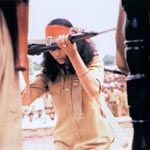|
 |
 |
 |
 |
 |
Domain Theatre FREE |
 |
 |
 |
Wednesday 1 November 2pm & 7.15pm
Sunday 5 November 2pm |
|
 |
 |
Wednesday 8 November 1.30pm & 6.30pm
Sunday 12 November 1.30pm
|
|
 |
 |
Wednesday 15 November 2pm & 7.15pm
Sunday 19 November 2pm |
|
 |
 |
Wednesday 22 November 2pm & 7.15pm
Sunday 26 November 2pm |
 |
|
Bandit queen
Dir: Shekar Kapur 1994
120 mins 35mm Colour Rated R (18 years & over only admitted)
Seema Biswas, Nirmal Pandey
Hindi with English subtitles
With a reputation for performing strong character roles, Assamese actor, Seema Biswas shot to stardom with the controversial role of fierce outlaw, Phoolan Devi. Set in the Indian state of Uttar Pradesh in the 1970s, Bandit Queen is an extraordinary portrait of Devi, the Goddess of the Flowers, the Queen of the Ravines, who, for five years, headed an all male band of lawless outsiders. She was driven to banditry and revenge by years of brutal treatment and ritual misogyny, beginning in childhood with a forced marriage and culminating in the killing of her bandit lover. In 1983, when her surrender was negotiated, she had become a folk heroine.
Courtesy Channel 4 International |
 |
 |
 |
|
 |
 |
Wednesday 29 November 1.30pm & 6.30pm
Sunday 3 December 1.30pm
|
|
 |
 |
Saturday 9 December 2pm |
|
 |
 |
Saturday 9 December 2.40pm |
|
 |
 |
Wednesday 6 December 2pm & 7.15pm
Sunday 10 December 2pm |
 |
|
Ankur (The seedling)
Dir: Shyam Benegal 1973
131 mins 35mm Colour Rated R
Anant Nag, Shabana Azmi
Shabana Azmi’s first screen role playing Lakshmi, a downtrodden maidservant, won her the National Award for Best Actress and ensured a rapid rise to screen goddess status as the ‘First Lady’ of Hindi art cinema. Ankur, the directorial debut of Shyam Benegal, is considered the founding work of the 1970s Middle Cinema or New Indian Cinema movement – a cycle of modest, realist, low budget productions often depicting the lives of the downtrodden and oppressed. In this story examining the rigid caste system, the subjection of women and ruling-class privilege, a well-to-do young man is forced to give up his college education to oversee his father’s isolated rural property. Bored and frustrated, he becomes attracted to his maidservant, who is the wife of a farm labourer.
Courtesy Blaze Productions |
 |
 |
 |
|
 |
 |
Wednesday 13 December 2pm & 7.15pm
Sunday 17 December 2pm |
|
 |
 |
Wednesday 20 December 2pm & 7.15pm |
 |
|
Notorious
Dir: Alfred Hitchcock 1946
102 mins 16mm B&W Rated M
Ingrid Bergman, Cary Grant
Of all the goddesses of Western cinema, Ingrid Bergman is one of the most incandescent. With her natural beauty and simple acting style, female audiences found her unforced and unspoiled. Her affair, in 1949, with Italian director, Roberto Rossellini, while on the set of Stromboli, sent American women into an uproar and demonstrated that even the most celebrated goddesses have woman’s problems, pains and passions. In 1946 Bergman anticipated her fall from grace when she played Alicia, a ‘notorious’ woman employed by the US government to uncover enemy operations in Brazil during World War 2. Her job becomes complicated when her contact agent, T.R. Devlin (Cary Grant), falls in love with her. In a very plausible portrayal of grown-up sexuality, Hitchcock circumvented the censors, who had strict guidelines regarding the depiction of intimacy, and created a love scene where Grant and Bergman nibble each other on the ears, nose and lips for three minutes while they whisper about whether or not to have chicken for dinner.
Collection NFVLS |
 |
 |
 |
|
 |
 |
Wednesday 27 December 2pm & 7.15pm
Sunday 31 December 2pm |
|
 |
 |
Wednesday 3 January 2pm & 7.15pm
Sunday 7 January 2pm |
|
 |
 |
Wednesday 10 January 2pm & 7.15pm
Sunday 14 January 2pm |
|
 |
 |
Wednesday 17 January 2pm & 7.15pm
Sunday 21 January 2pm |
 |
|
High society
Dir: Charles Walters 1956
107 mins 35mm Colour Rated G
Bing Crosby, Grace Kelly, Louis Armstrong, Frank Sinatra
‘I’m a cold goddess,’ Grace Kelly intones in her final screen performance in this classic 1956 MGM musical. Her Hollywood career was short but spectacular and Kelly demonstrates here why she dazzled and captivated the world. No sooner was she recognised for her natural beauty by directors, producers and public alike, than her career was over and she was a real Princess. As the aloof, imperious, rich and spoiled, Tracy Lord, she discards men who don't live up to her perfectionist expectations, including composer ex-husband, C.K. Dexter-Haven (Bing Crosby). Now she’s about to embark upon a second marriage. In order to find fulfilment, Tracey has to step down from her pedestal. A stellar cast of admirers (Sinatra, Armstrong, Crosby) is only too willing to help.
Courtesy Chapel Distribution |
 |
 |
 |
|
 |
 |
Wednesday 24 January 2pm & 7.15pm
Sunday 28 January 2pm |
|
|
 |
|
 |
 |
|
